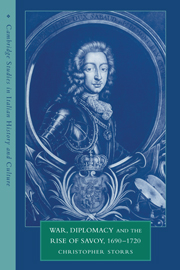Book contents
- Frontmatter
- Contents
- List of illustrations
- Acknowledgements
- List of abbreviations
- Map: The Savoyard state, 1690–1720
- Introduction
- 1 The Savoyard army, 1690–1720
- 2 Savoyard finance, 1690–1720
- 3 Savoyard diplomacy, 1690–1720
- 4 Government and politics in the Savoyard state, 1690–1720
- 5 The Savoyard nobility, 1690–1720
- 6 Regions and communities in the Savoyard state, 1690–1720
- Conclusion
- Select bibliography
- Index
2 - Savoyard finance, 1690–1720
Published online by Cambridge University Press: 21 July 2009
- Frontmatter
- Contents
- List of illustrations
- Acknowledgements
- List of abbreviations
- Map: The Savoyard state, 1690–1720
- Introduction
- 1 The Savoyard army, 1690–1720
- 2 Savoyard finance, 1690–1720
- 3 Savoyard diplomacy, 1690–1720
- 4 Government and politics in the Savoyard state, 1690–1720
- 5 The Savoyard nobility, 1690–1720
- 6 Regions and communities in the Savoyard state, 1690–1720
- Conclusion
- Select bibliography
- Index
Summary
Money was, necessarily, a constant concern of Victor Amadeus II in these decades because war, as contemporaries never tired of pointing out, could not be fought without it. Ordinary peacetime revenues were often sharply reduced while expenditure rocketed. By the same token, however, war might be the single most important factor in the drive towards that long-term increase in government revenues, and the ability of the state to extract tax (and other) revenues which was a marked feature of early modern Europe. How governments responded to the fiscal demands of warfare could have important implications for the process of state formation, whether defined as simple territorial expansion or as the assertion of greater, ‘absolute’ authority (or its weakening) within the existing or expanding state, or both. Historians of Habsburg Spain and of Louis XIV's France, for example, have argued that the sheer cost of war necessitated compromises to secure the required funds which undermined an earlier ‘absolutist’ achievement (itself often created in response to the challenge of war). By contrast, the decades after 1688 saw the development in Britain, in large part to meet the demands of war against France, of new political and fiscal institutions and practices – what John Brewer has dubbed the ‘fiscal-military state’ – which represented an alternative to the ‘absolutist’ model across the Channel but which in some respects approximated to it.
- Type
- Chapter
- Information
- War, Diplomacy and the Rise of Savoy, 1690–1720 , pp. 74 - 121Publisher: Cambridge University PressPrint publication year: 2000



